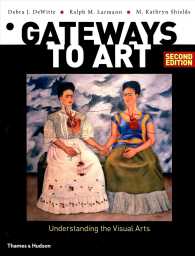- ホーム
- > 洋書
- > 英文書
- > Politics / International Relations
Full Description
Populist Authoritarianism focuses on the Chinese Communist Party, which governs the world's largest population in a single-party authoritarian state. Wenfang Tang attempts to explain the seemingly contradictory trends of the increasing number of protests on the one hand, and the results of public opinion surveys that consistently show strong government support on the other hand. The book points to the continuity from the CCP's revolutionary experiences to its current governing style, even though China has changed in many ways on the surface in the post-Mao era. The book proposes a theoretical framework of Populist Authoritarianism with six key elements, including the Mass Line ideology, accumulation of social capital, public political activism and contentious politics, a government that is responsive to hype, weak political and civil institutions, and a high level of regime trust. These traits of Populist Authoritarianism are supported by empirical evidence drawn from multiple public opinion surveys conducted from 1987 to 2014. Although the CCP currently enjoys strong public support, such a system is inherently vulnerable due to its institutional deficiency. Public opinion can swing violently due to policy failure and the up and down of a leader or an elite faction. The drastic change of public opinion cannot be filtered through political institutions such as elections and the rule of law, creating system-wide political earthquakes.
Contents
Chapter 1 CHINESE POLITICAL CULTURE AND REGIME SUSTAINABILITY
Introduction
Why Does Political Culture Matter?
Mass Line: the Origin of the Populist Authoritarian Political Culture
Primitive Accumulation of Social Capital in China
Political Culture in Post-Mao China
The Plan of the Book
Political support: local vs. center
Regime stability and national identity
Social capital
Political trust in China and Taiwan
Protest and regime sustainability
Labor dispute resolution
Political trust: an experimental study
Populist Authoritarianism: A Theoretical Discussion
Using Survey Data to Study Political Change in China
Chapter 2 AUTHORITARIAN REGIME SUSTAINABILITY
The Coming Collapse of China: How Soon?
Modernization and democracy
Regime crisis
Regime durability
Horizontal vs. vertical supports
How Satisfied and Happy Are the Chinese?
Government Dissatisfaction and Life Dissatisfaction
Public Anger, Political Action and Democratic Change
Conclusions
Chapter 3 NATIONALISM AND REGIME SUSTAINABILITY
Theories of Nationalism
Nationalism in China
Sources of Chinese Nationalism
The Political Consequences of Chinese Nationalism
Conclusions
Chapter 4 INTERPERSONAL TRUST AND REGIME SUSTAINABILITY
The Puzzle
Interpersonal Trust and Democracy
Origins of Interpersonal Trust
Confucian Tradition
Socialist Legacy
Economic Growth and Marketization
Findings I: Classification of Interpersonal Trust
Three Types of Interpersonal Trust
Three Types of Trust and General Interpersonal Trust
Findings II Trust and Political Attitudes and Behavior
Conclusions
Chapter 5 POLITICAL TRUST IN CHINA AND TAIWAN
What is political trust?
Competing theories of political trust
Political mobilization
Economic satisfaction
Internal efficacy
External efficacy
Culture
Comparing China and Taiwan: Methods and Data
Measuring and comparing political trust in China and Taiwan
Measuring and comparing the sources of political trust in China and Taiwan
Multivariate analysis of political trust in China and Taiwan
Conclusion and discussion
Chapter 6 REGIME INSPIRED CONTENTIOUS POLITICS
The Rise of Contentious Politics in China
The Contentious Politics Literature
Regime-Mobilized Contentious Politics in China
Institutional Deficiencies and Populist Authoritarianism
Examples of Regime Mobilized Contentious Politics
Case Studies and Large-N Analysis
The Scope of Collective Action
Group Leaders
Regional Distribution
Multivariate Analysis
Central and local governments
Targets of group action
Unfair treatment
Age
Education
Gender
Urbanization and ethnicity
Conclusions and Discussion
Chapter 7 INDIVIDUAL DISPUTE RESOLUTION
Scope and Type of Disputes
Channels of Dispute Settlement
Established official channels
Emerging institutional channels
Non-institutional channels
Hypothetical and actual channels
Socio-economic characteristics of dispute resolution
Economic Organizations and the Politics of Dispute Resolution
Conclusion and discussion
Chapter 8 POLITICAL TRUST: AN EXPERIMENTAL STUDY
List experiment
Data and methodology
Findings
Robustness Check
Conclusions and Discussion
Chapter 9 POPULIST AUTHORITARIANISM: A PRELIMINARY THEORETICAL DISCUSSION
Key components of the PA Model
The Continuity of the Mass Line Ideology
Social Capital and Interpersonal Trust
Political Contention and Participation
Weak Institutions
The Hyper Responsive Government
Strong Political Support
The PA Model and Civic Culture
The PA Model and the BA State
The PA Model and the Existing Studies of Mass Politics
The PA Model and the Study of Comparative Politics







